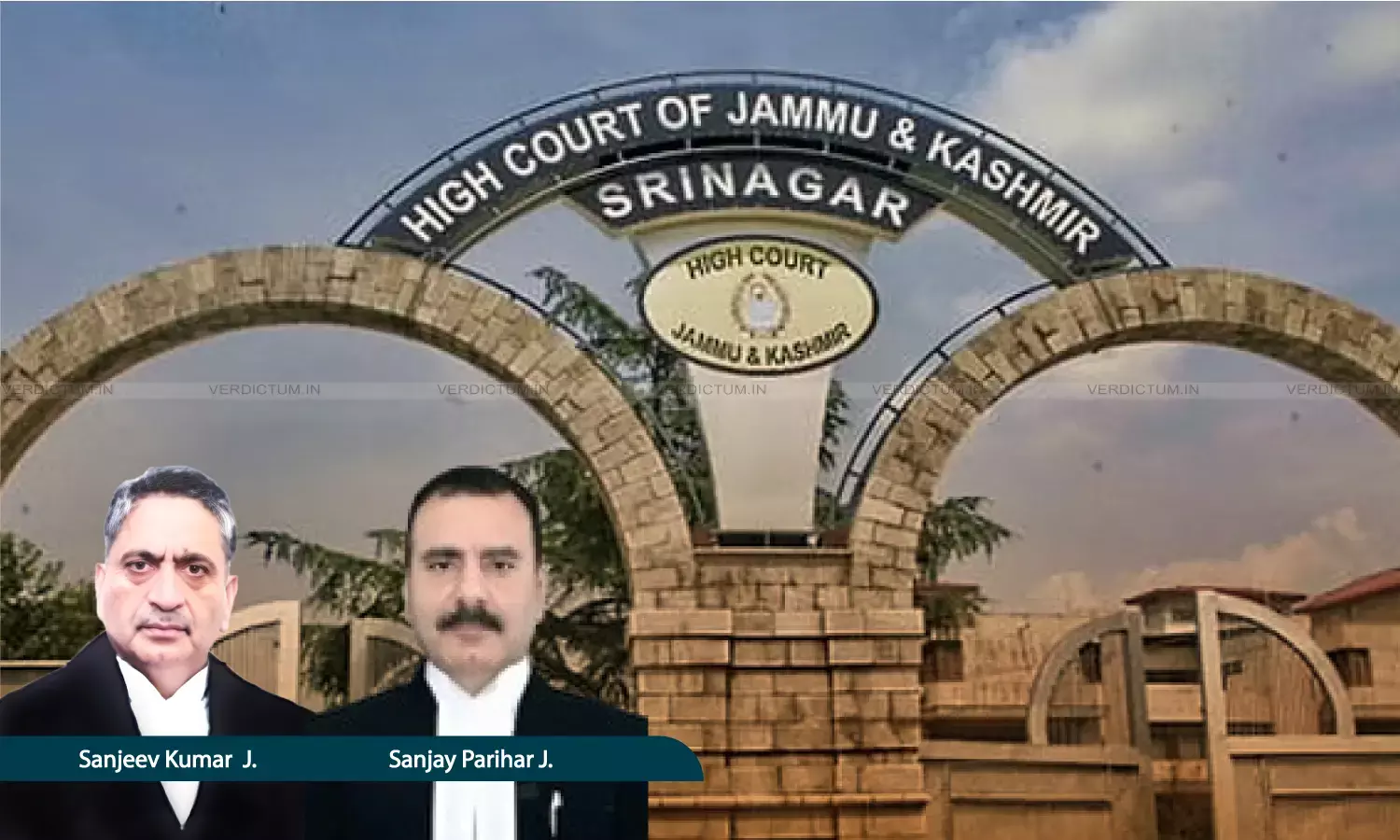Appellate Tribunal Vested With Power Of Remand U/S.26 (4) Of PMLA: Jammu & Kashmir and Ladakh High Court
The Jammu & Kashmir and Ladakh High Court was considering an appeal filed under Section 42 of the Prevention of Money Laundering Act, 2002.

Justice Sanjeev Kumar, Justice Sanjay Parihar, Jammu & Kashmir and Ladakh High Court
The Jammu & Kashmir and Ladakh High Court has held that Section 26 (4) of the Prevention of Money Laundering Act, 2002, would vest in the Appellate Tribunal powers of remand as consequential to the power to set aside the order appealed against.
The High Court was considering an appeal filed under Section 42 of the Prevention of Money Laundering Act, 2002.
Referring to the provisions of the Act, the Division Bench of Justice Sanjeev Kumar and Justice Sanjay Parihar stated, “From a plain reading of Section 26, in particular subsection (4) thereto, it is abundantly clear that the words “may pass such orders thereon as it thinks fit” are of the widest amplitude and would vest in the Appellate Tribunal powers of remand as consequential to the power to set aside the order appealed against.
The Bench further held, “It is thus settled law that the power to set aside an order by the Appellate Tribunal includes the power to remand, which is a necessary attribute or concomitant of the power to annul or set aside the order under appeal, unless such power is expressly, or by necessary implication or intendment, taken away by the statute which creates the appellate tribunal.”
Senior Advocate R.A.Jan represented the Appellant, while Deputy Solicitor General of India T.M.Shamsi represented the Respondent.
Factual Background
The second appellant and his family members are promoters of a company named M/S Trison Farms and Construction. The second appellant was arrested by the National Investigating Agency on the allegation that he was a conduit to transfer funds received from Pakistan and the Pakistan High Commission in Delhi to various persons in Kashmir. During searches, various documents were seized which showed that the second appellant had received Rs 1,64,10,000 during the year 2015-16 from illegitimate sources and passed it on to different persons engaged in separatist activities in Kashmir. The first appellant was not named in any FIR, ECIR or any criminal complaint.
The first respondent- Deputy Director, Directorate of Enforcement, New Delhi, passed a provisional attachment order attaching the basement and ground floor, which was in the name of the first appellant. The Adjudicating Authority confirmed the attachment ordered. The appellants filed appeals before the appellate Tribunal and prayed for the setting aside of the order of confirmation. The Appellate Tribunal allowed the same but remanded the matter back to take de novo proceedings and issue fresh notice to the appellants along with “reasons to believe” so as to afford the appellants adequate opportunity to file a reply. The Appellants thus challenged this order of the Appellate Tribunal before the High Court.
Reasoning
Highlighting that the power of remand is an important postulate of any authority exercising appellate jurisdiction and vested with the power to confirm, modify or set aside the order appealed against, the Bench reaffirmed the view of the Supreme Court that the power to set aside or annul an order appealed against would necessarily carry with it the power to pass such ancillary and concomitant orders as may be necessary to give effect to the order of annulment or setting aside of the order appealed against.
“If we were to concede that the appellate Tribunal can only confirm, modify or set aside the order of Adjudicating Authority appealed against and cannot remand the matter, it would present a paradoxical situation where the Tribunal, after setting aside an order on the ground of procedural error or a technicality, would be left helpless and allow the appellants to reap the fruits of procedural error or of a mere technicality”, it added.
The Bench noted that the Appellate Tribunal had only set aside the confirmation order and not quashed the proceedings before the Adjudicating Authority. It was further noted that the Adjudicating Authority, on remand, would be put in the same position in which it stood at the time of passing the order confirming the provisional attachment.
On a perusal of the facts of the case, the Bench noted that the Appellate Tribunal had only set aside the confirmation order, not the proceedings before the Adjudicating Authority under Section 8 of the Act of 2002. The Appellate Tribunal, by setting aside the confirmation order and remanding the matter back to the Adjudicating Authority, had merely restored the proceedings to the stage at which the Adjudicating Authority had passed the confirmation order.
Thus, dismissing the appeals, the Bench upheld the orders of the Appellate Tribunal.
Cause Title: Sarwa Zahoor v. Deputy Director, Directorate of Enforcement (Case No.: RFA (OS) No.1/2025)
Appearance
Appellant: Senior Advocate R.A.Jan, Shahid Habib
Respondent: Deputy Solicitor General of India T.M.Shamsi, CGC Faizan Ahmad

